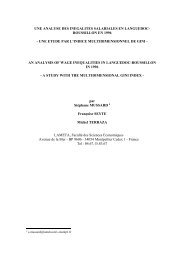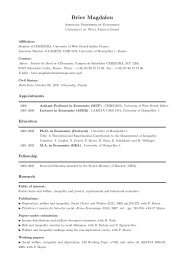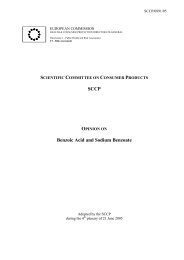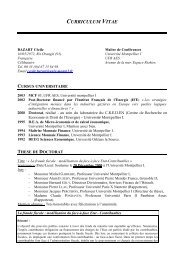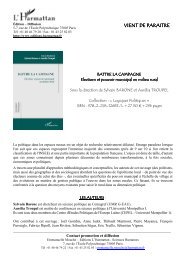COLLECTIVE INTEREST VS - Lameta
COLLECTIVE INTEREST VS - Lameta
COLLECTIVE INTEREST VS - Lameta
You also want an ePaper? Increase the reach of your titles
YUMPU automatically turns print PDFs into web optimized ePapers that Google loves.
<strong>COLLECTIVE</strong> <strong>INTEREST</strong> <strong>VS</strong>. INDIVIDUAL <strong>INTEREST</strong> INBENTHAM‘S FELICIFIC CALCULUS. QUESTIONINGWELFARISM AND FAIRNESSAntoinette Baujard 12Abstract. The core idea of utilitarianism for Bentham is to establish that onlyindividual utilities count in social welfare. There can be two distinct interpretations ofthis apparently simple principle. According to one view, individual utilities representthe basic information for the calculation of social welfare: this is how utilitarianismworks. According to a second view, social welfare is maximized if and only ifindividual utilities are maximized: this is what justifies utilitarianism. This aim of thispaper is to show: that these two interpretations should not be confused; that theycorrespond to distinct definitions of welfarism; that they are likely to conflict; andthat as a consequence we can draw important and surprising conclusions for politicalphilosophy and economic science. One such conclusion is that fairness should beprior to goodness in a consistent Benthamian doctrine.JEL classification code: B12, B31, D63Key-words: interest, utility, is and ought, external effects, goodness and fairness,welfarism, formal welfarism, ethical welfarismINTRODUCTION―It is vain to talk of the interest of the community, without understanding what is theinterest of the individual.‖ So Bentham writes in the first chapter of The introduction tothe principles of morals and legislation. It is now standard to call ―welfarist‖ the view1 Antoinette Baujard, CREM, University of Caen, F-14 000, Antoinette.Baujard@unicaen.fr2 Previous versions of this paper have benefited from the reactions of participants at the 2006 ESHETmeeting in Porto (April 2006), the 3LB workshop (Strasbourg, November 2006), the Charles GideDays (Aix-en-Provence, December 2006), the PGPPE winter ′08 meeting on the History of PublicEconomics (Paris, December 2008) and the third JFFoS symposium (Shonan Village, Japan, January2009). The research on which the paper is based has been supported by funds from ANR and the 3LBprogramme. I here thank André Lapidus, Herrade Igersheim, Keith Tribe, and two anonymousreferees for their valuable comments. Needless to say, any remaining deficiencies are my own, as arethe views expressed in this paper.1
according to which the collective interest derives only from individual utilities. 3 Thefact that Bentham considers the sum of individual utilities to be the criterion ofcollective welfare may be controversial, but it cannot be doubted that he is himselfwelfarist. 4 Having established that, new issues arise: What is this individual interestwhich is linked to community interest? Is it that which guides individual behaviour?Is the link between the positive and the normative aspect of interest straightforward?What would be the exact definition of Bentham‘s welfarism?The crux of all these issues lies in the opposition between particular interests andcollective interests, as well as in the distinction between ‗is‘ and ‗ought‘. I suggest thatconsideration of these two oppositions will enrich our appreciation of Bentham‘swritings. Focusing on his felicific calculus, their reformulation permits us to understandthe ethical and analytical link between private and collective interests.This article is organized as follows. In the first section I introduce some standardreadings of Bentham‘s view of ‗is‘ and ‗ought‘ and discuss relevant ways in which wecan move beyond mere registration of their distinction. I propose to reformulate theproblem by specifying the normative or the positive formulation of individual orcollective interests. In the second section, I show that a duality of the individual‗ought‘ is derived from this analysis: among the two notions of the individual ‗ought‘,one relates to the individual level, the other to the collective level. In the thirdsection, this result is shown to be relevant both for Bentham studies and forcontemporary debates in welfare economics. I will in particular claim that this viewentails, in most contexts, a necessary distinction between a formal definition ofwelfarism (at the theoretical level), and an ethical definition of welfarism (at thephilosophical level). 5 From this will be derived a disturbing conclusion: it will beshown that the link made between private and collective interests in the standardreading of Bentham is mistaken, a finding that also applies to utilitarianism in general.There is a consistent and inescapable consequence: that in Bentham‘s utilitarianismfairness should be given priority over goodness.3 The term was first popularized in two articles written by Amartya Sen, one published in the EconomicJournal (Sen, 1979a), and the other one in the Journal of Philosophy (1979b).4 The following statement is just one of several similar passages: ―De quoi se compose le bonheur totalsi ce n‘est des utilités individuelles? ‖ (in Bentham 1831, Vol.1: 26) [All quotations in French arewritten in French in the original version.]5 This paper follows Baujard (2009), entitled ―A Return to Bentham‘s felicific calculus I. From MoralWelfarism to Technical Non-welfarism‖, in which the presentation of the calculus leads toconsideration of the distinction between technical welfarism—at the applied level—and ethicalwelfarism—at the philosophical level.2
1 THE NORMATIVE AND THE POSITIVE ANALYSIS OF UTILITYStandard views of the ‘is’ and the ‘ought’ in Bentham’s works―I. Nature has placed mankind under the governance of two sovereign masters, painand pleasure. It is for them alone to point out what we ought to do, as well as todetermine what we shall do. [...]II. [...] By the principle of utility is meant that principle which approves ordisapproves of every action whatsoever (...), and therefore not only of every action ofa private individual, but of every measure of government.‖ (Bentham, 1789: 1-2)In Bentham‘s works, utility is the axis both of a positive principle and a normativeprinciple. 6 The former is relative to ‗is‘: seeking pleasure and avoiding pain guidesindividual action; psychological law or psychological hedonism is at stake. One canspeak of the ―measure of the pleasures of the senses‖. 7 The latter is relative to‗ought‘: the society‘s objective is to obtain the greatest happiness for the greatestnumber; 8 universal hedonism is at stake. One can speak of the ―measure of a goodgovernment.‖ 9 These two elements define a principle of utility, valid at the individualand at the collective level. 10According to some authors both classical and contemporary utilitarianism arecharacterized by a controversial tension between the positive and the normativeaspects of utility (Halévy, 1901; 1905; Harrison, 1983; Audard, 1999). Ph. Mongin(1995: 385) in particular regrets that ―the two views remain alien from one another.‖ 11Applying this same principle to two different levels, normative and positive on theone hand, individual and collective on the other hand, is thought to be problematic,6 See Mongin (1995), Mongin and Sigot (1999).7 Cot (2000: 290)8 Or, rather, the principle of the greatest happiness; see Burne (1949).9 Cot (2000: 290)10 ―By the principle of utility is meant that principle which approves or disapproves of every actionwhatsoever. According to the tendency it appears to have to augment or diminish the happiness of theparty whose interest is in question: or, what is the same thing in other words to promote or to opposethat happiness. I say of every action whatsoever, and therefore not only of every action of a privateindividual, but of every measure of government.‖ (Bentham 1789: 5)11 ―We know of no contemporary author who considers the relationship between the is and the oughtwithin utilitarianism.‖ Our translation of [henceforth, Trans.]: ―Nous ne connaissons pas d‘auteurcontemporain qui thématise la relation de l‘être et du devoir-être à l‘intérieur de l‘utilitarisme.(...)‖3
and requires some clarification. While utility is the basis of what is and what ought tobe, the ‗is‘ and the ‗ought‘ do not always coincide. The distinction might even beconsidered as evidence of a contradiction. 12 Without committing ourselves to suchextreme positions, the links between the normative and the positive aspects ofutilitarianism have been questioned by utilitarians and their commentators fromdifferent perspectives: the difference between psychological hedonism, and universalhedonism (Sidgwick, 1874; Guidi, 2007); the role of egoism or self-interest (Vergara,1998; Mongin and Sigot, 1999); individual or extra-individual prudence (Halévy,1905); the distinction between the economic and the politic domain (Halévy, 1901;Sigot, 2000); the role of State (Sigot, 1993); the individual and the collective aspect ofthe utility principle (Sigot, 1993, 2001); the distinction between a moral utilityfunction and a personal utility function (Harsanyi, 1955; 1992); the issue oflaundering preferences (Goodin, 1986), or, more generally, the choice of a model ofutility suited to the ethical project (Broome, 1991; Haslett, 1990). Nevertheless, if allof these positions establish—or negate—the existence of a contradiction, none ofthem confronts the persistence of such an opposition. Beyond the mereacknowledgement of a contradiction or of a distinction, a formal differentiationbetween the ‗is‘ and the ‗ought‘ is thought to be necessary, raising the question oftheir controversial link. Here we intend to discuss the development of this debateconcerning tensions and analytical links between the ‗is‘ and the ‗ought‘ by referenceto utilitarian theories of justice, taking Bentham‘s utilitarianism as a fundamentalreference. We shall now introduce our approach to the problem, and demonstratethat it will also require consideration of the link between private and collective levels.The distinction between the ‗is‘ and the ‗ought‘ acknowledges a divide that does exist,but which should not be allowed to persist. It exists because individuals, acting inaccordance with their own happiness, do not always act in such a way that thecollective interest 13 is maximised. The ‗is‘ and the ‗ought‘ may therefore be inconflict, 14 yet imply no inconsistency in Bentham‘s utilitarianism (see Guidi, 2004). As12 See for instance Harrison (1977: 654): ―Mr. Parekh also claims, rather darkly (p.116), that Benthamgave no reason for holding that ‗personal and political life should both be regulated by the sameprinciple‘.‖ See also the position of Friedman (1948) who points out Bentham‘s ―refusal to see thereality of conflict between the individual interest and that of the community.‖13 I will not here discuss the difficulties of determining what ―interest‖ is in actual situations. See Laval(1993). I will employ a minimalist definition of ―interest‖, as what is good for the individual or thecommunity.14 ―But does not the moralist consider himself necessarily condemned to resolve this absurd problem:in a society in which each individual is necessarily selfish, how can one nonetheless render alldisinterested?‖ Trans. ―Mais alors le moraliste ne se voit-il pas condamné, par profession, à résoudre ce4
a consequence, the community‘s interest would be at a higher level than that of thestatus quo if a different set of incentives could be designed such that each memberwould, eventually, act in such a way that the higher interest is realized. 15 Benthamseeks to generate a transparent and rational society, organized through both theprinciple of utility defined at the collective level, and the principle of individualinterest (See Cot (2000)).Individual interests and collective interest in Bentham’s worksThe problem of the distinction between the is and the ought is therefore shiftingtowards the reconciliation of individual interest with the community interest.Whenever they coincide this gap is bridged. According to Halévy‘s reading ofutilitarianism, there are three ways of identifying individual and collective interests.The first is the sympathetic fusion of interests; it supposes that individual interest isnot selfish interest. The second concerns the natural identification of interests: ifevery one were to spontaneously act in an ethic manner—not necessarilyconsciously—there would in fact be no conflict between individual and collectiveinterests. This apparently trivial statement comes from Bentham‘s economicphilosophy. The resulting spontaneous order finds echoes in libertarian theory, wheregovernment intervention is neither necessary, nor expected. These two approachesare however insufficient. Bentham devotes the principal part of his work todeveloping the third approach embedded in his philosophy of law: the artificialidentification of interests. Outside intervention is necessary if collective andindividual interests are to achieve compatibility. 16 Such intervention takes the formproblème absurde : dans une société où chaque individu est égoïste, et se doit à lui-même de l‘être,obtenir cependant que tous les individus soient désintéressés ? ‖ Halévy (1905, III: 197)15 ―Homo oeconomicus is not generally motivated to make the right choices from an aggregateperspective. Because most choices have externalities, the optimal decision for an individual is oftensub-optimal for society as a whole. Much of Bentham‘s work was devoted to the design of ‗politicalsanctions‘ meant to change the balance of an agent‘s pleasure and pain via the police power of theState, but he also acknowledged the complementary role of ‗moral sanctions‘ in internalizingexternalities, and thus in inducing the right choices for promoting aggregate happiness.‖ Warke (2000a:374)16 ―If all men wish to be happy, but cannot be so, is it not because the means which individuals use tothis end are mutually contradictory? […] Since this reduces the attraction of pleasure, it is necessaryto threaten the infliction of pain equal at least in intensity to the pleasure to which the individualaspires. Such threats convert these actions into offences. The science of intimidation, that is,legislation, general utility, these are the motivation, and pain is the sanction of the obligations which itimposes. In society, the Legislator is the great dispenser of pleasure and pain. It is he who createsmoral order, the equilibrium of interests. Society is the construct of his artifice. There we find hisapplication of what we have called the principle of the artificial identification of interests.‖ Trans.5
either of external intervention—the Civil or Penal code, the legal-administrativesupervision of the town or city, or suitable legislation (Bentham, 1830; 1827; 1872);or internal intervention, resorting to a deontologist (Bentham, 1831).There are two ways of tackling the problem of identification of interests in Bentham‘swork. The first consists in considering the diversity of the modalities of identification.Some authors have noted an opposition between his economic and political stances,defending a natural identification in the former case and an artificial identification ofinterest in the latter. 17 But it is difficult to uphold this schizophrenic relationshipbetween the economic and the legislative domain. Other writers have recently shownthat Bentham also supports state intervention in the economic domain. 18 Anexception to this demarcation moderates this view.The second approach to consideration of the gap between individual and collectiveinterests is to focus on the case of artificial identification of interests. I thereforefocus upon those states in which artificial identification is the only reliable modalityof a junction of interests. The same conclusion can be obtained: according to theprinciple of utility, any domain, political or economic, is likely to need—or is not―Tous les hommes veulent être heureux ; mais ne peut-il pas, ne doit-il pas arriver que les moyensemployés par les divers individus pour être heureux soient contradictoires entre eux ? [...] Puisquecelui-ci cède à l‘attrait du plaisir, il faut le menacer de l‘infliction d‘une douleur au moins égale enintensité au plaisir auquel il aspire. Par ces menaces, des actes sont érigés en délits. La science del‘intimidation, voilà la législation ; l‘utilité générale est la raison d‘être, et la peine est la sanction desobligations qu‘elle impose. [...] Le législateur est, dans la société, le grand dispensateur des plaisirs etdes peines. C‘est lui qui crée l‘ordre moral, l‘équilibre des intérêts. La société est l‘œuvre de sesartifices. – Ainsi trouve son application ce que nous avons appelé le principe de l‘identificationartificielle des intérêts.‖ Halévy (1905, III: 216-217)17 ―However, the two principles upon which rest both the legal and the economic philosophy of theBenthamites are contradictory. This contradiction entirely shatters the familiar precepts ofBenthamism. Do we then have to resolve this contradiction by saying that each of the two principleshas its application in distinct domains that the principle of the artificial identification of interests is thetrue principle of the science of law, and the principle of natural identity of interests the true principleof economic science? It is obvious that Bentham has borrowed from two contradictory sources increating his system.‖ Trans. ―Or, les deux principes sur lesquels reposent respectivement la philosophiejuridique et la philosophie économique des Benthamites sont deux principes contradictoires : lacontradiction éclate à chaque instant dans les formules courantes du Benthamisme. [...] Faudra-t-ildonc se borner à résoudre la contradiction en disant que les deux principes trouvent chacun sonapplication dans un domaine distinct, que le principe de l‘identification artificielle des intérêts est levéritable principe de la science du droit et le principe de l‘identité naturelle des intérêts le véritableprincipe de la science économique ? Il est évident que Bentham a emprunté à deux sourcescontradictoires d‘un même système.‖ Halévy (1905, III: 219)18 See Sigot (1993) among others.6
likely to need—a degree of state intervention 19 . As a matter of fact, Benthamintroduces an economic means for managing judicial, political and non-marketissues. 20 The tension between the ‗is‘ and the ‗ought‘ is not just a problem ofadjudication; Bentham proposes an economic means of dealing with it. Deeperunderstanding of the character of the artificial identification of interests is thereforethe most fitting way to analyze the issue of the linkage between the is and the ought.We direct our attention to those specific cases where an artificial identification ofinterests is required: how to ensure that individual actions, arising from decisionsmade at the individual level, might respect the principle of utility defined at thecollective level. It should be recalled that the positive principle applies at theindividual level, while the normative principle applies at the collective level. We hencehave to deal with two issues: the positive vs. normative problem on the one hand,and individual interests vs. collective interest on the other. We contend that simplystating this distinction is likely to be merely confusing, and that a clear statement ofthe link between each of the levels is necessary.Even though, to be meaningful, the normative principle requires an aggregation stage,both the positive and the normative principles rely on individual interests and henceon the utility of the things or actions leading to this interest. If there exists a tensionbetween the hedonic and the ethical principles, between individual interests and thecollective interest, it should be clearly enough revealed via the process of definingindividual utility.A reformulation of the ‘is’ and ‘ought’ issueThis movement from `is‘ to `ought‘ and back, between the individual and thecollective level, is constantly present in the texts devoted to Bentham‘s ―felicificcalculus‖. 21 To clarify my argument I will first introduce some notation, assummarized in table 1, to be used in the following discussion.19 On this see Sigot (1993; 2001).20 ―It should not be forgotten than political economy was for Bentham a branch of the science oflegislation‖ Guidi (2002: 176). In this perspective, Bentham created the ―pre-history‖ of welfareeconomics and of the economic analysis of law.21 See the references to different treatments of the utility calculus in Mitchell (1918: 164). See also Guidi(2007).7
Table 1: Behaviours and interests guiding behaviours in Bentham‘s utility calculusPositive principleDescription ofbehavioursNormative principleEvaluation of thesituationsIndividual level iU i/ V iCollective level =( 1 ,…, i ,…, n ) WLet us first present the positive part. The individual level is described by identifyingactions i for individual i. At the collective level, the positive analysis hence consistsin the combination of the list of actions of all of the n individuals ( 1 ,…, i ,…, n ).This could be considered to be a mere description of social states. Actions or socialstates are, in any case, justified or prompted by some normative principles. At theindividual level, each individual seeks her own interest 22 or happiness, represented bythe functions U i or V i , as we shall see below. Her motive to act is the expectation ofmore pleasure and less pain. Utility is the property of things or actions to providemore pleasure and to limit pain; it is therefore the guiding principle for individualbehaviours. This relation between motives and interest for one person i from thecommunity generates the choice of action i , (as we described it) at the positivelevel. 23 Hence, as i is maximizing i‘s interest, the list of individual choices ( 1 ,…, i ,…, n ) is supposed to maximize each individual‘s interest. At the collective level,what ought to be is the greatest happiness (of the greatest number). The principle ofutility is defined in the following way: each action ought to be assessed by this22 See Mongin and Sigot (1999) and references quoted in their article.23 Note that there can be different motives as explanation of the same behaviour; each a iis then theresult of a function of some complex—and, probably, multi-dimensional (See Warke (2000b))—combination of feeling or anticipation of pain or pleasure.8
principle, i.e. an action should be completed if it does lead to more pleasure and lesspain for the community; it should not be done in the converse case. Let us call thisobjective W for Social Welfare.Let us now deepen the relationship between individual utilities and Social Welfare.Consistently in table 1, ( 1 ,…, i ,…, n ), and W may be considered as the resultinglevel of individual utility or collective welfare. The following discussion should aidthorough description of the underlying functions, in particular showing the stakesinvolved by the domain of individual utility functions. The principle of utility definesSocial Welfare as a function of individual interests or happiness. There are somefragments of textual evidence, though very few, in which Bentham defends the ideaof a sum of individual interests, attributing the same weight to each. In his own words,―the interest of the community is one of the most general expressions that can occurin the phraseology of morals: no wonder that the meaning of it is often lost. When ithas a meaning, it is this. The community is a fictitious body, composed of theindividual persons who are considered as constituting as it were its members. Theinterest of the community then is, what? —the sum of the interests of the severalmembers who compose it.‖ (Bentham, 1789: 5). More generally, Bentham‘sutilitarianism requires that this social welfare should be based exclusively onindividual utilities: note that this is specifically the definition of welfarism. It is nothowever obvious in Bentham‘s texts whether individual actions should eventually bejustified at the individual level, or by the utility principle at the collective level. On thefirst interpretation, person i would justify her action i because it maximizes herutility U i , without further consideration. On the second interpretation, the sameaction i would be justified because it contributes to maximize social welfare W.Some could claim that this probably amounts to the same principle: as W is based oneach individual‘s utilities among which U i and i maximizes U i , each action eventuallycontributes to the increase of social welfare W. This is certainly so in some cases.This would notably be the case if we supposed complete independence betweenindividuals. 24 But this miraculous conjunction obviously fails to be true in the specificcases where the artificial junction of interests is needed, i.e. as soon as we account forinteractions and we consider the effect of the passage of time. Then the principlesdefined at the individual or at the collective level do not merge into one.24 The action of Miss i would be independent of the action of Mr. j if she never once changed hermind once she knew what he had done. If she is gregarious, she might want to change the colour ofher blouse, for example, so that she is wearing the same colour as he is. These kinds of preferencesshould not be excluded from the present study.9
As a consequence, the normative principle for an individual might be different,depending on whether we focus upon individual or collective interests. In the formercase, what is at stake is really the individual interest (U i ) in itself 25 . In the latter case,what is important is eventually how mister i‘s individual interest (V i ) contributes tothe greatest happiness of the greatest number. The rest of this paper aims atdetermining whether or not there is any difference between these two versions of theindividual objective, called (U i ) and (V i ) within Bentham‘s doctrine, and, if so, themeaning and the consequences of such a difference. So that we might establish whatanalytical links there are between the positive and the normative side it is necessary todemonstrate the existing or desired links between i , ( 1 ,…, i ,…, n ), W, U i and V i .2 TWO NOTIONS OF INDIVIDUAL <strong>INTEREST</strong>SThe design of distinct incentives for different individual interestsA behaviour i can be judged according to normative criteria, but not the motivesexplaining this behaviour. 26 The principle underlying behaviour is self-interest, whichis justified by the definition of the welfarist principle. An appropriate choice of eachindividual behaviour i is hence supposed to maximise each personal U i —at least inthe event of a correct calculation. At the collective level, ( 1 ,…, i ,…, n ) is thedescription of all individual behaviours. W should evaluate the consequence of thislist, hence of the complex interactions between individual actions. Benthamrecognizes there are cases for which the combination of these decentralized primaryindividual behaviours ( 1 ,…, i ,…, n ) do not induce spontaneously the best socialoptimum W. 27 If the social optimum—the greatest W—cannot be reachedspontaneously, one should design different incentives, so that seeking her individualinterest now induce individuals to act (’ i ) in the right direction, i.e. so that (‘ 1 ,…,‘ i,…,‘ n ) maximizes W.25 ―3. It is said to be a man‘s interest that the act, the event, or the state of things in questions shouldhave place, in so far as it is supposed that—upon and in consequence of its having place—good, to agreater value, will be possessed by him than in the contrary case. In the former case, interestcorresponds to a single item in the account of good and evil; in the latter case, it corresponds to abalance on the side of good. ‖ Bentham (1817: 208)26 ―There is not any such thing as a bad motive. [nor good ones].‖ Bentham (1817: 215)27 Individual behaviours can be evaluated as generating good or bad social results and we may wish tochange them, but according to Bentham‘s doctrine we should not evaluate the motives of allindividuals leading to this result as long as they derive from a desire to raise individual utility.10
The aim is to obtain a specific list of behaviours (‘ 1 ,…,‘ i ,…,‘ n ), different from theprevious list ( 1 ,…, i ,…, n ), and which is now likely to maximise W. There is noinner contradiction in this description. Nevertheless, this reasoning is specific to thecollective level of analysis: we talk of collective interest (W), assessing the result of allindividual behaviours together. But the actual policies are to be enforced at theindividual level: the new system of individual incentives is designed so that the newindividual action ’ i is distinct from i , given that individuals keep on seeking theirindividual interest. This simply means that this design has recomputed the actualindividual interest in some utility V i , indeed distinct from U i .Let us summarize. As long as all individuals seek their own interest (U i ) i N , they donot necessarily seek the greatest collective interest W. If a new system of incentivesmanages to reorientate individual interests into (V i ) i N , which is likely to be differentfrom the previous list (U i ) i N , then individuals seeking their new interests (V i ) i N willeventually maximise W. In other words, there exist two kinds of individual interestfor Bentham. We will now call U i the self-defined interest for individual i; and V i thecollectivity-defined interest for individual i. Self-defined interest does not strictlyimply egoism, but a restriction of relevant information for defining one‘s individualinterest. Collectivity-defined interest does not imply altruism, but an extension ofadmissible information to collective states for defining one‘s individual interest.As a preliminary conclusion, we claim that, if no contradiction lies between the ‗is‘and the ‗ought‘ in general, the key issue lies rather in the ambiguity over the individual‗ought‘. When they merge, an analytical continuity between the individual and thecollective level should hold. When they do not do so spontaneously, continuity isonly restored by the collectively-defined interest V i . The definition and the status ofthe latter hence ought to be justified since it eventually derives from a technologicalrelation between individual behaviours. If the ethical link between individual andcollective interests appears clearly in Bentham‘s doctrine, the whole theory can beconsistent only if the positive link between them is also made explicit.Ethical link between individual and collective interestsThe ethical link between the individual interest and the collective interest establishedby Bentham respects the two following criteria: the principle of valuing individualinterests for themselves and the rejection of natural law and fundamental rights (SeeCot 1993). It is, firstly, based on the following condition: individual interests are theonly elements from which collective welfare can be derived—this defines Bentham‘s11
‗welfarism‘. 28 Bentham establishes that what is of interest for an individual shouldnecessarily be of interest for the community. If an action is likely to increasesomebody‘s interest, it should increase the interest of the entire community. Thisbasically corresponds to the weak Pareto criterion founding the social welfarefunction. Trouble arises when (among other things) an increase in somebody‘sinterest is associated with a decrease in the interest of some other member of thecommunity. If one is to avoid impossibilities or incompleteness, the fairness basis ofthe trade-off has to be clarified.Secondly, the collective interest is indeed built by some specific combination ofindividual interests. The aggregation could be a simple summation of individualinterests, 29 but this option is sometimes controverted (See Shackleton 1972;Goldworth 1979). It could also be any version of possible aggregation of individualinterests.30 We can note that relying on a sum implies acceptance—or evenjustification—of a reduction in one person‘s level of private interest insofar as itpermits the overall improvement of the collective interest. At first sight, this can beconsidered to be a contradiction with the primary principle of welfarism, since itimplies the sacrifice of certain interests in favour of the community, rather thandefining the community interest in respect to and according to the evaluations ofindividual interests.This doubt gives rise to a third remark. The question of compatibility of individualinterests is translated into a problem of weighting the pains of some with the pleasureof others, and the gap between the different nature of individual and collectiveinterest is not easily bridged by the simple assumption of aggregation. Welfarismrequires that individual interests be at stake at the collective level, even though somemay be sacrificed to reach a higher level of collective welfare. The identification ofthe relevant individual interests is therefore questionable, and we will see how thisleads into a discussion over whether these are better defined by V i or (U i ).Positive link28 ―It is vain to talk of the interest of the community without understanding what is the interest of theindividuals.‖ (Bentham, 1789: 3); Trans. ―De quoi se compose le bonheur total si ce n‘est des unitésindividuelles ?‖ (Bentham (1831a: 26); on utilitarianism and welfarism, see Sen (1979b).29 For instance: ―By the universal interest, understand the aggregate of those same interests‖ (Bentham1823: 269); ―The interest of the community then is, what? —the sum of the interests of the severalmembers who compose it.‖(Bentham 1789: 4)30 For a simple consideration of the majority of persons, see Ayer‘s view in Keeton andSchwartzenberger (1948), discussed by Mundle (1949: 120).12
Myrdal (1932: 51) claims that belief in a link between the positive and the normativelevel requires an assumption of natural harmony of interests: ―the whole doctrine ofharmony is implied in [the] logical transition from the psychological to the ethicaltheory‖, from individual to collective ends (See Hume (1969: 299)). For Myrdal, thisthesis of natural harmony is highly controversial—and, further, inconsistent withBentham‘s ambition to do away with natural law (See Cot (1993)).Why does behaviour i , which has been chosen to obtain the greatest U i , notspontaneously contribute to a greater W—meaning this behaviour does not maximisethe corresponding V i , which does maximises W? Three types of reason may explainwhy individual behaviour does not necessarily serve one‘s own interest. First,individuals may be mistaken about their own interests because they are not wellinformed. Second, the ability of individuals to properly calculate are limited: they maymake mistakes about the best possible choices even though they wish to seek theirown interest, and even though they wish to seek the collective interest. As for thethird type of reason, there exist ‗external effects‘. The latter are taken into account inBentham‘s felicific calculus through the criteria of fecundity, purity and extension. 31 Healso acknowledges the role of social interaction in people‘s happiness. 32 In otherwords, interaction, whatever the context, is indeed likely to induce sub-optimalities,as soon as private costs/benefits are different to public costs/benefits.Mechanisms to enforce the linkThere is no reason why U i and V i should be the same, but their result should becomethe same. The entire task which Bentham has set himself consists in finding ways toenforce this positive link between these two different notions of individual interest.31 See Bentham (1789: 30). For a reconstruction of this calculus, see Baujard (2009).32 ―A greater part of the pleasures of a man is subject to the will of others, and such pleasures can behad only through their agreement and co-operation. It is not possible to neglect the happiness ofothers without risking our own. We are not able to avoid the pain that it is in the power of others toinflict upon us if it does not accommodate their goodwill. Each man is united with the human race bythe strongest of connections, that of personal interest.‖ Trans. ―Une grande partie des plaisirs d‘unhomme est subordonnée à la volonté des autres, et il ne peut les posséder qu‘avec leur concours et leurcoopération. Il nous est impossible de négliger le bonheur des autres sans risquer le nôtre. Nous nepouvons éviter les peines qu‘il est au pouvoir des autres de nous infliger, si ce n‘est en nous conciliantleur bon vouloir. Chaque homme est uni à la race humaine par le plus fort de tous les liens, celui del‘intérêt personnel.‖ Bentham (1831: 158)13
In a Christian society, one could consider increasing the sense of duty in individuals.Yet a sense of duty is not useful, and not even necessarily efficient. 33 The intentionwhich they imply is of little interest. 34 All that matters is actual effects. And the effectsof all individuals actions, moved by the desire of more pleasure and less pain, shouldeventually lead to the optimal society, where the greatest happiness is obtained.Explaining i or saying that individual i seeks his own interest U i indeed amount tothe same thing, which is the axiomatic basis of Bentham‘s works: 35 one cannot expectthe normative objective to be enforced through simple means—such as laws or senseof duty—because the positive description of utility will always be more powerful.Therefore, the only way to re-direct the behaviours of individuals along the right linesis to modify their perception of their individual interest from U i to V i . This newperception can be obtained by making available more information about thesituation, or by modifying the context for the actual calculation of individual interest.In each case, individuals are not the best judges of what is good for them: they aremistaken in their calculus. The appeal to a deontologist 36 may help each individual toaccount for the three reasons given above in his calculus. But the deontologist is notjust there to teach how to make good calculations, he also has a role in transferringinformation from one person to another and so building well-founded expectationsof other people‘s behaviour. 3733 ―A man, a moralist, boastfully ensconced in his armchair, digresses in pompous phrases on dutiesand obligations. Why doesn‘t anyone listen to him? Because when he talks of duty, each thinks of selfinterest.It is in man‘s nature to think of self-interest before anything else, and it is for this reason thatevery enlightened moralist will consider it in his interest to begin—it would be well said and well done– with duty always taking second place to self-interest.‖ Trans. ―Un homme, un moraliste, s‘étalegravement dans son fauteuil, et là, vous le voyez dogmatiser en phrases pompeuses sur le devoir et lesdevoirs. Pourquoi personne ne l‘écoute-t-il ? Parce que, tandis qu‘il parle de devoirs, chacun pense auxintérêts. Il est de la nature de l‘homme de penser avant tout à ses intérêts, et c‘est par là que toutmoraliste éclairé jugera qu‘il est de son intérêt de commencer; il aura beau dire et beau faire, à l‘intérêtle devoir cedera toujours le pas.‖ Bentham (1831a: 17)34 See Bentham (1817: 215–218).35 ―Is it susceptible of any proof? It should seem not: for that which is used to prove everything else,cannot itself be proved: a chain of proofs must have their commencement somewhere. To give suchproof is as impossible as it is needless.‖ Bentham (1789: 4)36 See Bentham (1831).37 This is especially clear in the case of a coordination game.14
Public opinion 38 and, more generally, popular sanctions, 39 also enforce the linkbetween individual and collective interests, since the eventual aim is to have theimpression of considering the collective interest (W) as the objective of one‘s own V i .The panopticon 40 is the extreme solution: using the power of popular sanction toincorporate the collective interest in each person.Last but not least, the government modifies the system of utilities: with a system ofsanctions and rewards, 41 individuals will now do something they ought to do, ratherthan what they would have done spontaneously. 42In each solution reconciling the private and the collective interest, Bentham had toexert some pressure on the definition of the individual interest for it to fit properly.The tension that exists between the spontaneous U i and the desired V i raises aserious issue in Bentham‘s doctrine.3 THE CONSEQUENCES OF THE DISTINCTIONTwo notions of welfarism in Bentham’s doctrineBentham describes himself as what we would now call, following Sen‘s 1979‘s paper,a welfarist: ―What is good for the individual is what is good for the community". 4338 See Bentham (1831a: 30).39 See Bentham (1831a: 119).40 See Bentham (1872, Vol.4).41 See Bentham (1872), especially Vol.1 and 2.42 ―The morality of utilitarians is their economic psychology as an imperative. Two centuries earlier,Hobbes had founded an entire system of social despotism upon a doctrine of utility; in fact theprinciple of the artificial identity of interests upon which Bentham founded his legal theory justifies thefollowing interpretation of utilitarianism: it is the threat of chastisement inflicted by the sovereign thatmakes the individual associate interest with duty.‖ Trans. ―La morale des utilitaires, c‘est leurpsychologie économique mise à l‘impératif. Deux siècles plus tôt, Hobbes avait fondé sur la doctrinede l‘utilité tout un système de despotisme social; en fait, le principe de l‘identité artificielle des intérêts,sur lequel Bentham asseyait sa théorie juridique, justifiait une telle interprétation de l‘utilitarisme: c‘estla menace d‘un châtiment infligé par le souverain qui fait pour l‘individu la liaison de l‘intérêt avec ledevoir.‖ Halévy (1905, III: 206)43 ―[T]he greatest happiness of all the several members of the community in question, taken together, isthe end to which it is my desire to see all the arrangements employed in the delineation of it directed.[...] Should it be asked, Why is it your desire that the greatest happiness of all the several members ofthe community in question should be the end to which all the several arrangements employed in the15
Armed with the distinction between the two notions of individual interests, U i andV i , we now show that there are two distinct interpretations of this apparently simpleprinciple of welfarism. According to one interpretation, the basic information neededfor the calculation of social welfare is individual utilities; we will henceforth call thisinterpretation the formal definition of welfarism. According to a secondinterpretation, social welfare is maximized if and only if individual utilities aremaximized: this is what justifies utilitarianism. We will henceforth call thisinterpretation the ethical definition of welfarism.The formal definition of welfarism describes the way utilitarianism works: what isgood for individual (premise) is what is good for the community (conclusion).Aggregation of individual interests, as presented above, suffices to bring this about.Sometimes a deontologist is needed to help individuals to understand what their―true‖ interest is. 44 How should we define ‖true individual interest‖ as against mereindividual interest? Consistent with the first and second reasons why collective andindividual interest does not converge, the deontologist will assist individuals inrecognizing their own interest whenever there is problem of information, or lack ofability to calculate. The third problem emphasised above was that of external effects:other individuals sometimes play a role in any given individual interests. Let usimagine a case in which the action of Mr. 2 has some effect upon Miss 1‘s selfinterest.His action was driven by his own motives: to obtain the greatest pleasure andthe least pain. All the same, by taking into account the effect of Miss 2‘s own actionhe may find that the best action in regard to his interest should have been different.This sequence calls for improved calculation, using more information and taking intoaccount clear and reliable expectations of other people‘s actions. 45 In this particularinstance the deontologist may help each individual to become more rational, to seektheir best interest, society consequently attaining a higher W. These two first types ofdelineation of the form of government, by which that same community is governed, should bedirected? my answer is, – because on the occasion in question, such is the form, the establishment ofwhich would in the highest degree be contributory to my own greatest happiness.‖ Bentham (1827: 7)44 ―The task of the enlightened moralist is to demonstrate that an immoral act represents a falsecalculation of personal interest, and that a vicious man effects a faulty estimation of pleasure andpain.‖ Trans. ―La tâche du moraliste éclairé est de démontrer qu‘un acte immoral est un faux calcul del‘intérêt personnel, et que, l‘homme vicieux fait une estimation erronée des plaisirs et des peines.‖Bentham (1831a: 19-20)45 This involves strategic behaviour capable of game theoretic formalization. This specific case iscovered by a coordination game, or more generally any non-zero-sum game. In each case the exampleneeds describing more specifically, but the overall idea remains the same.16
eason why individual behaviour does not always contribute to private or collectiveinterests do not raise any theoretical problems likely to destabilize utilitarianism.Hence the welfarist proposition is secure; it is simply a matter of information andcalculation. But this might not always be true in the third type of reason.Hence we now turn to consider external effects or, more generally, the effects ofinteractions upon the distinction between the two interpretations of welfarism:between formal and ethical welfarism. Imagine a case when the overly badconsequences of Miss 2‘s action will never have consequences for her individualinterest. Bentham gives examples of this: ―If such were the condition of humanbeings that the happiness of no one being came in competition with that of anyother,—that is to say, if the happiness of each, or of any one, could receive increaseto an unlimited amount, without having the effect of producing decrease in thehappiness of any other, then the above expression might serve without limitation orexplanation. But on every occasion, the happiness of every individual is liable tocome into competition with the happiness of every other. If for example, in a housecontaining two individuals, for the space of a month, there be a supply of food barelysufficient to continue for that time; not merely the happiness of each, but theexistence of each, stands in competition with, and is incompatible with the existenceof the other.‖ 46 This externality cannot be internalized by improved calculation. Thereis no reason why the individual should consider it as an objective in itself. Neither isthere any reason why the deontologist should intervene on a strict welfarist basis ifwe retain the first interpretation. Yet, at the collective level, some individual interestsshould be traded-off against those of another. There is therefore for the society apurpose, an end, justifying the manner in which this trade-off could be made. Theaggregation principle is needed to move beyond a mere clash of interests, but it is notpart of the welfarist principle (See Sen (1979)). Once defined, this society‘s objectiveshould become an authoritative and indirect end for each individual. Normativeindividual interests should therefore, for a Benthamite doctrine, be better representedafter this reconstruction. In the examples analyzed above, some notion of individualinterest in the integration of external effects generated should be introduced, eventhough the individual does not perceive them. 47 This eventually implies modification46 Bentham (1827: 6)47 ―If as above, so it be, that in the situation of a ruler, whatsoever that situation be, the conduct of noman can reasonably be expected to be governed by any interest that stands, at that same moment, inopposition to that which, in his conception, is his own individual interest, it follows, that for causing itto take that direction, in which it will be subservient to the universal interest, the nature of the caseaffords no other method, than that which consists in the bringing of the particular interest of rulersinto accordance with the universal interest.17
of the definition of individual interest. At the community level, the individual ‗ought‘should be different to that at the individual level: it is imposed at the level of thecommunity. We have therefore shown the actual distinction between (U i ) and (V i ),and, further, the primary importance of (V i ) over (U i ).Henceforth, rather than asserting that ‗what is good for the individual (premise) isgood for the community (conclusion)‘, we claim that instead Bentham maintains thefollowing principle: ‗What is good for the community (premise) is what is good forthe individual (conclusion)‘. This corresponds to the ethical definition of welfarism(rather than to the formal): if social welfare is maximized, then so are individualutilities; this inversion of causality between private and collective interests suggeststhat the first step is the maximisation of (V i ), rather than of (U i ). To be consistentwith the theory of collective welfare this formulation of the principle of Bentham‘sutilitarianism requires either a further criterion of aggregation and trade-off betweenindividual utilities, or a reconstruction of individual interests.By considering another case we will now show that the two definitions of welfarismmay clash. The action of Mr. 2 has some effect upon Miss 1‘s self-interest. Takinginto account the effect of Mr. 2‘s action on Miss 1‘s action, Mr. 2 may find that thebest action for his interest should have been different. In fact this can be elaboratedby applying to Bentham‘s framework the now familiar scenario of the prisoner‘sdilemma. If one individual does pay attention to the action of another (assisted by adeontologist whose task is teaching how one should follow one‘s best interests) heshould be tempted to choose his dominant strategy. If both individuals carefullycompare the utility of all alternatives, given the choice of the other, they will bothchoose their best strategy, i.e. the one leading to more pleasure and less pain, giventhe other individual‘s behaviour. From a prisoner‘s dilemma they eventually arrive ata Pareto-dominated equilibrium: a state different from the state derived from rationaldecentralized decisions would be better for both of them. Bentham would obviouslyHere, then, we have a third principle of the first rank, in addition to the two former ones. Call it, themeans-prescribing, or junction-of-interests-prescribing, principle. The first declares, what ought to be, the next,what is, the last, the means of bringing what is into accordance with what ought to be. Meantime, thisjunction of interests, how can it be affected? The nature of the case admits but of one method, whichis, the destroying the influence and effect of whatever sinister interest the situation of the individualmay expose him in the action of; this being accomplished, he will thereby be virtually divested of allsuch sinister interest; remains as the only interest whereby his conduct can be determined, his right andproper interest, that interest which consists in the share he has in the universal interest, which is thesame thing as to say, that interest, which is in accordance with the universal interest, taken in theaggregate.‖ Bentham (1827: 6–7)18
not dispute this actual equilibrium. He proposed legislation, a constitution 48 and stateintervention so that such a loss of collective interest might be avoided—taking intoaccount the disutility induced by state-intervention, 49 or any devices leadingindividuals to adopt the collective interest as their own. 50 Intervention will becomeacceptable where intervention produces globally more pleasure and less pain thanwould result in the absence of such intervention. Bentham seeks to induce differentbehaviours for each individual, leading to the greatest happiness. 51 In the prisoner‘sdilemma, the mere consideration of each of the N distinct self-defined interests U imechanically leads to a sub-optimal social outcome; all individual utilities shouldclearly be transformed from (U i ) i N to (V i ) i N so that social welfare may bemaximized. This demonstrates once again the direct connection between the second48 ―This Constitution has for its general end view the greatest happiness of the greatest number; namelyof the members of this political state: in other words, the promoting or advancement of their interests.By the universal interest, understand the aggregate of those same interests. This is the all-comprehensiveend, to the accomplishment of which, the several arrangements contained in the ensuing code are allof them directed.‖ And in a note: ―* If the nature of the case admitted the possibility of any suchresult, the endeavour of this constitution would be—on each occasion, to maximize the felicity of everyone of the individuals, of whose interests the universal interest is composed; on which supposition, thegreatest happiness of all, not the greatest number only, would be the end aimed at.But such universality is not possible. For neither in the augmentation given to the gross amount offelicity, can all the individuals in question ever be included; nor can the infelicity, in which the expenseconsists, be so disposed of, as to be borne in equal amount by all: in particular, such part of that sameexpense, as consists in the suffering produced by punishment.Thus it is, that to provide for the greatest felicity of the greatest number, is the utmost that can bedone towards the maximization of universal national felicity, in so far as depends on government.‖Bentham (1823: 269)49 ―Government cannot be exercised without coercion; nor coercion, without producing unhappiness.Of the happiness produced by government, the net amount will be—what remains of happiness,deduction made of the happiness.‖ Bentham (1823: 269)50 Such as the Panopticon.51 ―When I say the greatest happiness of the whole community, ought to be an end of object of pursuit,in every branch of the law—of the political rule of action, and of the constitutional branch inparticular, what is it that I express? —this and no more, namely that it is my wish, my desire, to see ittaken for such, by those who, in the community in question, are actually in possession of the powersof government; taken for such, on the occasion of every arrangement made by them in the exercise ofsuch their powers, so that their endeavours shall be, to render such their cause of action contributoryto the obtainment of that same end. Such then is the state of that faculty in me which is termed thewill; such is the state of those particular acts or modifications of that faculty, which are termed wishesor desires, and which have their immediate efficient causes in corresponding feelings, in correspondingpleasure and pain, such as, on the occasion in question, the imagination brings to view.‖ Bentham(1827: 4)19
definition of welfarism (the ethical definition) and the distinction between the twonotions of individual interests. Moreover, the first definition of welfarism (the formaldefinition) is thus not always consistent with the aim of maximizing individualutilities. In other words, formal welfarism and ethical welfarism may conflict.Welfarism seems a nice word to describe a simple concept, upon which utilitarianismcan then be founded. More thorough analysis has suddenly upset this comfortablestate of affairs by introducing a sharp distinction between the information levelassociated with the individual utilities (U i ) i N which leads into a formal definition ofwelfarism, and the outcome level based on (V i ) i N which leads into the ethicaldefinition. 52 Individual utilities should not be used in advance of any reconstructionfrom U i to V i for calculation of the collective social welfare in regard to ethicalwelfarism as such. As the father of utilitarianism, Bentham is obviously welfarist; buthe is not welfarist according to the formal definition (which is the usual attributionwithin contemporary welfare economics); he is instead welfarist according to theethical definition.Goodness and Fairness in Bentham’s doctrineLet us take seriously what is at stake in reconstructing individual utilities beforemaking any ethical judgments. Utilitarianism turns out not to be a theory that can bestraightforwardly applied once we have information about individual utilities; first, itis imperative to reconstruct accurate information on these utilities.Recall that individual utilities (U i ) i N represent the principle of the Good in anyutilitarian theory, among them that of Bentham. The entire utilitarian system issupposed to induce the Good and the Just to merge. If we retain the standard formaldefinition, this merger is implemented bottom-up—from the individual level to thecollective level. Henceforth, Goodness is prior to fairness, as is consistent with thestandard conception of utilitarianism.But (V i ) i N is and ought to be different from (U i ) i N . (V i ) is defined in a top-downway, from the collective level to the individual level. Defining an ethical criterion atthe collective level introduces issues of justice issues rather than of individualmorality as such. There is in fact no problem of justice on Robinson Crusoe‘s island,at least until Friday comes along. There is however clearly a problem with justice atthe collective level when one seeks to tackle the problem of distribution among52 Notice the proximity of this more nuanced formulation to the distinction between eudemonia andwelfarism. See Sen (1979b: 472) or Kolm (2005).20
several persons and, above all, when there is also at stake the correction of negativeexternalities—as for instance in the reformulation of individual utilities into V i totake into account the interaction structure of the prisoner‘s dilemma. As soon as thelist (V i ) i N is taken into account, rather than mere individual interests in themselveswithout regard to interactions, then justice becomes prior to the good. The priority offairness over goodness inevitably recalls Rawls‘s definition of political liberalism. 53Paradoxically, Rawls‘s theory of justice as fairness is intentionally opposed toutilitarianism specifically in this regard.Here we need to distinguish discussion of Bentham‘s doctrine from that of otherutilitarian theories. We shall demonstrate that this irksome paradox is essential forBentham‘s doctrine to be consistent, even though others have rather avoided thisfact. The merging of individual and collective interests is indeed at the heart of allutilitarianism doctrines. Other contemporary utilitarians did indeed tackle thisproblem explicitly. Harsanyi (1955, 1992) for instance makes a formal differencebetween subjective utilities and moral utilities. Those now using the preference modelof utility introduced many conditions for relevant preferences in constructing socialutility: preferences should be informed, based on true beliefs, and rational. 54 Someeven acknowledge the necessity of laundering preferences, 55 rejecting meddlesome,altruistic, or sadistic preferences, among others. This process of launderingpreferences, or the construction of a well-designed ethical utility independent ofactual preferences, is a step backwards in respect to strict welfarism. An ontologicaltheory of value is needed to design what would be considered ethical utility, orappropriate laundering. 56 Whenever the reconstruction of individual interest is basedon a substantial theory of the Good, as it is in all the above examples, the resultingutilitarian system gives priority to the Good over the Just. We should emphasise thefact that this substantial theory of the Good is exogenous to individual utilities. Inother words, these utilitarian theories require not only the two standards elements,welfarism and aggregation (as asserted by Sen (1979b)), but also a ‗third element‘:some idea of what is ontologically good for individuals. When this third element isintroduced into the theory, the priority of goodness over fairness emerges withoutdifficulty.53 See Rawls (1971, 1985, 1993, 2001).54 See Haslett (1990) for many relevant references.55 See Goodin (1986).56 See Nussbaum (2001). Note that the laundering process might suffer from the same criticismregarding paternalist as has been the case with the capability approach.21
However, this third element is an inevitable step towards natural laws or fundamentalrights. Bentham would not accept it. He was explicitly and fiercely opposed to suchan idea. One should recall that he described the French Declaration of the Rights ofMan as ―Nonsense Upon Stilts‖. 57 But without a third element there is no way tojustify exogenously the use of a different notion of individual utility. The requiredreconstruction of individual interests from U i to V i is based on a consideration ofcollective welfare W—here determined by aggregation—rather than on normativeconsiderations at the individual level. 58 As we claimed above, resorting to V i meansvaluing justice rather than goodness. The conclusion is now straightforward: forBentham, Fairness is prior to Goodness.Is Bentham conscious of the priority that his doctrine gives to fairness overgoodness, once consistently reformulated? First of all, Bentham does not intend tolend priority to one or the other, his objective is to bring about a merger of both.Hence most of his discussion is devoted to the absence of a gap between the Just andthe Good. Bentham wishes to decrease the importance of the State and increase thatof the deontologist. 59 The ideal society would be that in which no artificialenforcement were necessary, and where all individuals have incorporated thecollective interest as their own. In other words, he wishes that the problem did notexist. 60 That is why the issue, in the absence of externalities, the effect of time, and57 See his letter to Jacques Pierre Brissot De Warville, mid-August 1789. On this see Cot (1993).58 There is of course a direct link between such consideration and the standard criticisms regarding thesacrifice of minorities and authoritarian aspects of utilitarianism. See Foucault (1975), Baujard (2003:67–72).59 See Bentham (1831a: 37).60 ―In a good moral condition, the duty of a main should never be to do that which it is not in hisinterest to do. Morality teaches him to form a proper estimation of his interest and his duties; and inexamining he will perceive their coincidence. One is accustomed to say that a man has to do his dutyin the face of sacrificing his interests. It is not unusual to hear of this or that individual having madethis sacrifice, and there is never any lack of admiration expressed in such cases. But consideringinterest and duty in a broader perspective one will see that in the ordinary matters of life the sacrificeof interest to duty is not practicable, nor even very desirable; that such a sacrifice is not possible, andthat if made it contributes nothing to the well-being of humanity.‖ Trans. ―En saine morale, le devoird‘un homme ne saurait jamais consister à faire ce qu‘il est de son intérêt de ne pas faire. La morale luienseignera à établir une juste estimation de ses intérêts et de ses devoirs ; et en les examinant, ilapercevra leur coïncidence. On a coutume de dire qu‘un homme doit faire à ses devoirs le sacrifice deses intérêts. Il n‘est pas rare d‘entendre citer tel ou tel individu pour avoir fait ce sacrifice et on nemanque jamais d‘exprimer à son sujet son admiration. Mais en considérant l‘intérêt et le devoir dansson acception la plus large, on se convaincra que dans les choses ordinaires de la vie, le sacrifice del‘intérêt au devoir n‘est pas praticable, ni même beaucoup à désirer ; que ce sacrifice n‘est pas possible,22
even for certain configurations of externalities (see above) is not raised. Anyconclusion on the subject requires a focus on specific cases where an artificialjunction of interests can deal with this problem.Secondly, there are some hints that Bentham would not have totally rejected such aconclusion. He carefully uses words like ―the standard of right and wrong‖, 61 ―rightand proper‖, ―fairness‖ 62 where he could, as usual, use ―good‖ or ―bad‖. Consider inparticular this passage (Bentham 1827: 6): ―In the eyes of every impartial arbiter,writing in the character of legislator, and having exactly the same regard for thehappiness of every member of the community in question, as for that of every other,the greatest happiness of the greatest number of the members of that samecommunity, cannot but be recognized in the character of the right and proper andsole right and proper end of government, or say, object of pursuit. For thedesignation of the opposite, or reverse of what is right and proper, the term sinistermay, in consideration of the relation borne to each other by the two terms, taken intheir original physical sense be employed.‖ And he adds: ―That being taken for anend, to which it is right and proper that all legislative arrangements be directed, myopinion is, that as far as they go, the proposed arrangements which here follow wouldbe in a higher degree conducive to it than any other could be, that could be proposedin a work which was not particularly adapted to the situation of any one country, tothe exclusion of all others.‖ (Bentham, 1827: 7)). Bentham also insists on the factthat, eventually, the aim of each member is the interest of all, 63 not his own. Thesedoubts support the thesis that Bentham attributes a priority to fairness, when definedas the greatest universal happiness, over individual interests themselves.In sum, what is at stake at the individual level is not an individual notion of individualinterest, defining what is good; it is rather a reconstructed proxy for individualinterest that is supposed to be relevant and conducive to the most just situation. Theterm ‗just‘ is first of all imperative in so far as the objective of the society is defined atthis level. It is also justified by the fact that the interaction of individuals withet que, s‘il pouvait s‘effectuer, il ne contribuerait en rien au bonheur de l‘humanité‖ Bentham (1831a:17-18)61 Bentham (1789: 4)62 Bentham (1789: xxxvii)63 ―Hence it is, that to serve for all occasions, instead of saying the greatest happiness of all, it becomesnecessary to use the expression, the greatest happiness of the greatest number. If however, instead ofthe word happiness, the word interest is employed, the phrase universal interest may be employed ascorresponding indifferently to the interest of the greatest number, or to the interest of all.‖ Bentham(1827: 6)23
diverging interests is taken into account at the initiation of this reconstruction. As aconsequence, ‗what is good for the community is therefore good for the individual‘. Ido not claim Bentham had the intention, explicit or conscious, to give priority tofairness—this would not even be very convincing. But I have shown that such apriority underlies his theory, in the sense that it is required for a consistent version ofBentham‘s doctrine to obtain the anticipated merger between the Just and the Good.4 CONCLUSIONI have discussed accepted views of the ‗is‘ and the ‗ought‘ in Bentham‘s works. Utilityshould guide both, but there are conflicts with the latter. To state this is not toreveal—at least at this point—an inner contradiction in Bentham‘s theory; it rathertestifies to the complexity of the link between individual and collective interests. Ihave focused on those situations where a gap exists between individual and collectiveinterest, prompting examination of Bentham‘s ‗felicific calculus‘. The reconciliationof individual and collective interests requires that a link be established between thepositive and the normative levels. As there is not always spontaneously a harmony ofinterest at the positive level, the utility of objects should be modified to induce peopleto act in the right direction, which direction is defined by the utilitarian ethicalcriterion. I have put forward a reformulation of the positive and normative analysis ofindividual and collective interests, and focused on the analytical link betweenindividual behaviours and collective optimality. I then justified the distinctionbetween two notions of individual interest, depending on the level of analysis—individual or collective—or on the ethical view—goodness or fairness. This leads totwo main conclusions.Firstly, we have shown that Bentham‘s welfarism is confirmed in the ethicaldefinition, but could not be so confirmed in the formal definition. The relevantinformation at the individual level cannot be methodologically individualist and hasto take into account, for Bentham himself, other alternatives and other people assoon as externalities are taken seriously. The distinction between the U i individualinterest and the V i individual interest clearly questions the common intuitionaccording to which formal welfarism is simply a way of expressing ethical welfarismin mathematics and formal economic argument. As a consequence, we have shown ingeneral that there is no one-to-one relationship between the ethical definition ofwelfarism and the formal definition.Secondly, the thesis we have here advanced modifies our perception of Bentham‘stheory. ―Good‖ individual interest maximizes individual self-interest; ―fair‖ individualinterest maximizes—indirectly—the collective interest when individuals maximize24
their own. The latter definition is morally superior to the former. In other words, Iclaim that the father of utilitarianism attributes a priority to fairness over the Goodand that fairness is not merely deduced from the Good. This alters the standard viewon Bentham‘s utilitarianism, and might even disrupt our views about utilitarianism ingeneral. Utilitarians have, as in Harsanyi‘s theory, accepted a substantive theory of theGood, such as in the natural right tradition; or, as in Bentham‘s theory, commitmentto any theory of natural rights is explicitly rejected. In the former case, an externaltheory of the Good is necessary to create sufficient individual information—as withHarsanyi. In the latter case, a theory of fairness is primarily required—as Bentham.The primary importance of individual interests is therefore called into question, andthe collective interest becomes the foremost issue. Utilitarianism has based itsnotoriety and its success on the simple idea that it was primarily and essentially atheory which sought to take look after people‘s welfare, being the only good judge ofwhat is Good. This paper challenging this view, showing instead that utilitarianism isinstead based on a substantive theory of the Good or fairness, whether explicit ornot. Is this the death knell of utilitarianism? This paper seeks to further debateconcerning the possible inconsistency of Bentham‘s doctrine.Thirdly, this result contributes to contemporary debate in welfare economics. Whendefining a public objective, most social welfare functions in the literature are indeed(at least formally) welfarist, meaning they rely (simply) on individual utility functions.A concrete question could be: what kind of utility function should we use for thissocial welfare function? Should it be the rational consumer‘s utility function? It theanswer to this question is ―yes‖, then a relationship between rational choice theoryand normative theory, between the ‗is‘ and the ‗ought‘, would be necessary. It doesnot mean that ‗ought‘ and ‗is‘ are supposed close or identical, but that the ‗ought‘ isbuilt on a reformulation of the ‗is‘. What we have shown here is that, because of thisethical link and also a technical relation arising from inevitable interactions betweenindividuals, a further ethical link is built between individual and collective interests:the individual interest relevant for collective purposes is different to that relevant forindividual purposes. If we wished to re-interpret Bentham‘s view via a social welfarefunction, our conclusion would imply the use of utility functions distinct from thoseof the consumer. This would in turn imply substantial modification of the formaldefinitions of the utility function or of the preference relation used in the models ofcontemporary welfare economics.REFERENCES25
[1] AUDARD, C. Anthologie historique et critique de l’utilitarisme. Presses universitairesde France, Paris, 1999.[2] BAUJARD, A. Bien-être individuel et justice sociale. Fondement,caractérisation formelle et analyse normative. PhD thesis, Université de Caen Basse-Normandie, 2003.[3] BAUJARD, A. A return to Bentham‘s Felicific Calculus. From moral welfarismto technical non-welfarism. The European Journal of the History of Economic Thought 16, 3(sept. 2009), 431–453.[4] BENTHAM, J. Introduction to the principles of morals and legislation. Blackwell‘spolitical texts. Blackwell, Oxford, 1789. Intr. de W. Harrison, 1967.[5] BENTHAM, J. Traité de législation civile et pénale, vol. 1 : Principes de législation.Rey et Gravier, Libraires, Paris, 1802. par E. Dumont, 1830.[6] BENTHAM, J. A table of the springs of action. William Tait, Edimburgh, 1817. inBentham’s work, published under the superintendence of his executor John Bowring,Vol.1, 1843(1872).[7] BENTHAM, J. Leading principles of a Constitutional Code, for any state. William Tait,Edimburgh, 1823. first published in the Pamphleeter, N.44, 1823, ed. in Bentham’swork, published under the superintendence of his executor John Bowring, Vol.1,1843(1872).[8] BENTHAM, J. The Constitutional Code. William Tait, Edimburgh, 1827(1830). inBentham’s work, published under the superintendence of his executor John Bowring,Vol.9, 1843(1872).[9] BENTHAM, J. Déontologie ou Science de la morale, vol. 1. Charpentier, Libraireéditeur,Paris, 1831. revu, remis en ordre et publié par J. Bowring, traduit par B.Laroche, 1834.[10] BENTHAM, J. Déontologie ou Science de la morale, vol. 2. Charpentier, Libraireéditeur,Paris, 1831. revu, remis en ordre et publié par J. Bowring, traduit par B.Laroche, 1834.[11] BENTHAM, J. Bentham’s work, 1872 ed. William Tait, Edimburgh, 1843(1872).11 volumes.[12] BROOME, J. Reply to Kolm. Social Choice and Welfare 11, 3 (1994), 199–201.26
[13] BURNE, P. Bentham and the utilitarian principle. Mind, New Series 58, 231(1949), 367–368.[14] COT, A. Jérémy Bentham, un ―Newton‖ de la morale. In Nouvelle histoire de lapensée économique, A. Béraud and G. Facarello, Eds. La découverte, Paris, 2000,pp. 289–301.[15] COT, A. L. Utilitarisme, libéralisme économique et libéralisme politique:Jeremy Bentham et la boîte de Pandore des droits naturels. Économie et Sociétés,“Histoire de la pensée économique” 18, 12 (1993), 117–145.[16] FOUCAULT, M. Surveiller et punir. Tel. Gallimard, Paris, 1975.[17] FRIEDMAN, M. The methodology of positive economics. The University of Chicagopress, Chicago, 1953. pp. 3–46 reproduites in D. M. Hausman, The philosophy ofeconomics. An anthology, Cambridge University Press, chap. 10, pp. 210–244, 1984.[18] GOLDWORTH, A. Jeremy Bentham: On the measurement of subjective states.The Bentham Newsletter, 2 (mars 1979), 2–17. The Bentham Committee UniversityCollege, London.[19] GOODIN, R. E. Laundering preferences. In Foundations of social choice theory,J. Elster and A. Hylland, Eds. Cambridge University Press, Cambridge, 1986, ch. 3,pp. 75–101.[20] GUIDI, M. E. L. Review of ‗Nathalie Sigot, Bentham et l‘économie. Unehistoire d‘utilité.‘. Utilitas 16, 1 (march 2004).[21] GUIDI, M. E. L. On some asymmetries between pain and pleasure: Bentham‗felicific calculus‘ and his critique of Locke and his followers. In Handbook ofHappiness, L. Bruni and P. Porta, Eds. E. Elgar, Cheltenham, 2007, ch. 4.[22] HALEVY, E. La formation du radicalisme philosophique, vol. I : La jeunesse deBentham, 1776-1789. Presses Universitaires de France, Paris, 1901.[23] HALEVY, E. La formation du radicalisme philosophique, vol. II : L‘évolution de ladoctrine utilitaire de 1789 à 1815. Presses Universitaires de France, Paris, 1901.[24] HALEVY, E. La formation du radicalisme philosophique, vol. III : Le radicalismephilosophique. Presses Universitaires de France, Paris, 1904.[25] HARRISON, R. Bentham. The arguments of the philosophers. Routledge &Kegan Paul, London, Boston, Melbourne and Henley, 1983.27
[26] HARRISON, W. ‗Jeremy Bentham: Ten critical essays‘. edited by Bikhu Parekh.(London: Frank Cass, and Portland Oregon: International scholarly book services,1974. The American Political Science Review 71, 2 (1977), 654–655.[27] HARSANYI, J. C. Cardinal welfare, individual ethics, and interpersonalcomparisons of utility. Journal of Political Economy 63, 4 (1955), 309–321.[28] HARSANYI, J. C. Game and decision theoretic models in ethics. In Handbook ofgame Theory, R. J. Aumann and S. Hart, Eds., vol. 1. Elsevier Science Publisher, 1992,ch. 19, pp. 669–707.[29] HASLETT, D. What is utility ? Economics and Philosophy 6 (1990), 65–94.[30] HUME, L. J. Myrdal on Jeremy Bentham: Laissez-faire and harmony ofinterests. Economica 36, 143 (august 1969), 295–303.[31] KEETON, G. W., AND SCHWARZENBERGER, G. Jeremy Bentham and the law.A symposium edited on behalf of the faculty of laws of University College, London.Stevens & Sons Ltd., London, 1948.[32] KOLM, S.-C. Macro-justice. The political Economy of Fairness. Cambridge,2005.[33] LAVAL, C. Le ―sense of interest‖ de Jeremy Bentham. Economie et Sociétés 18,12 (1993), 147–169.[34] MITCHELL, W. C. Bentham‘s felicific calculus. Political Science Quarterly 33, 2(1918), 161–183.[35] MONGIN, P. L‘utilitarisme originel et le développement de la théorieéconomique. In La Formation du Radicalisme Philosophique, Elie Halévy ed., vol. 3 : LeRadicalisme. Presses Universitaires de France, Paris, 1995, ch. Postface, pp. 369–394.Également paru in La Pensée Politique, tome 3, pp. 341–361, Gallimard et Le Seuil,Paris, 1995.[36] MONGIN, P., AND SIGOT, N. Halévy‘s Bentham is Bentham. Philosophy 74(1999), 271–281.[37] MUNDLE. ‗Jeremy Bentham and the law.‘ A symposium edited on behalf ofthe faculty of laws of University College, London by George W. Keeton and GeorgeSchwarzenberger. London: Stevens & sons Ltd., 1948. Mind 58, 229 (1949), 101–130.28
[38] MYRDAL, G. The political element in the development of economic theory. TransactionPublishers, 1990, New Brunswick and London, 1932. translated by Paul Streetenfrom the German edition.[39] NUSSBAUM, M. C. Adaptive preferences and women‘s options. Economics andPhilosophy 17 (2001), 67–88.[40] RAWLS, J. La théorie de la justice comme équité : Une théorie politique et nonpas métaphysique. Philosophy and Public Affairs 14, 3. Trad. fr. par C. Audard, Individu etjustice sociale, Point, Seuil, Paris, pp. 279–317, 1988.[41] RAWLS, J. A Theory of Justice. The Belknap Press of Harvard university Press,1971. Trad. fr. par C. Audard, Théorie de la justice, Points Seuil, 1997.[42] RAWLS, J. Political Liberalism. Columbia University Press, 1993. Trad. fr. de C.Audard. Libéralisme politique, Presses Universitaires de France, 1995.[43] RAWLS, J. Justice as fairness. A restatement. Belknap, Harvard, 2001.[44] SEN, A. K. Personal utilities and public judgements : Or what‘s wrong withwelfare economics? The Economic Journal 89, 355 (septembre 1979), 537–558.[45] SEN, A. K. Utilitarianism and welfarism. The Journal of Philosophy 76, 9 (1979),463–489.[46] SEN, A. K. Minimal liberty. Economica 59, 234 (may 1992), 139–159.[47] SHACKLETON, R. The greatest happiness of the greatest number: the historyof bentham‘s phrase. Studies on Voltaire and the eighteenth century 90 (1972), 1461–1482.Also published in Bentham: Moral Political and legal philosophy, Vol. I : Moral and politicalphilosophy, ed. by Gerard J. Postema. The international library of critical essays inthe history of philosophy. Ashgate, Dartmouth, 2002. pp. 29-50.[48] SIDGWICK, H. The methods of ethics. Macmillan, 1874.[49] SIGOT, N. ‗Be quiet‘, mais modérément : Le rôle de l‘Etat dans la penséeéconomique de Jeremy Bentham. Revue Économique 44, 1 (janv. 1993), 23–50.[50] SIGOT, N. Bentham et l‘économie. Une histoire d‘utilité. Economica, Paris,2001.[51] SPRIGGE, T. L. S. The relation between Jeremy Bentham‘s psychological andhis ethical hedonism. Utilitas 11, 3 (nov. 1999), 296–319.[52] VERGARA, F. A critique of Elie Halévy. Philosophy 73, 1 (1998).29
[53] WARKE, T. Classical utilitarianism and the methodology of determinatechoice, in economics and in ethics. Journal of Economic Methodology 7, 3 (2000), 373–394.[54] WARKE, T. Multi-dimensional utility and the index number problem: JeremyBentham, J.S. Mill and qualitative hedonism. Utilitas 12 (2000), 176–203.30






